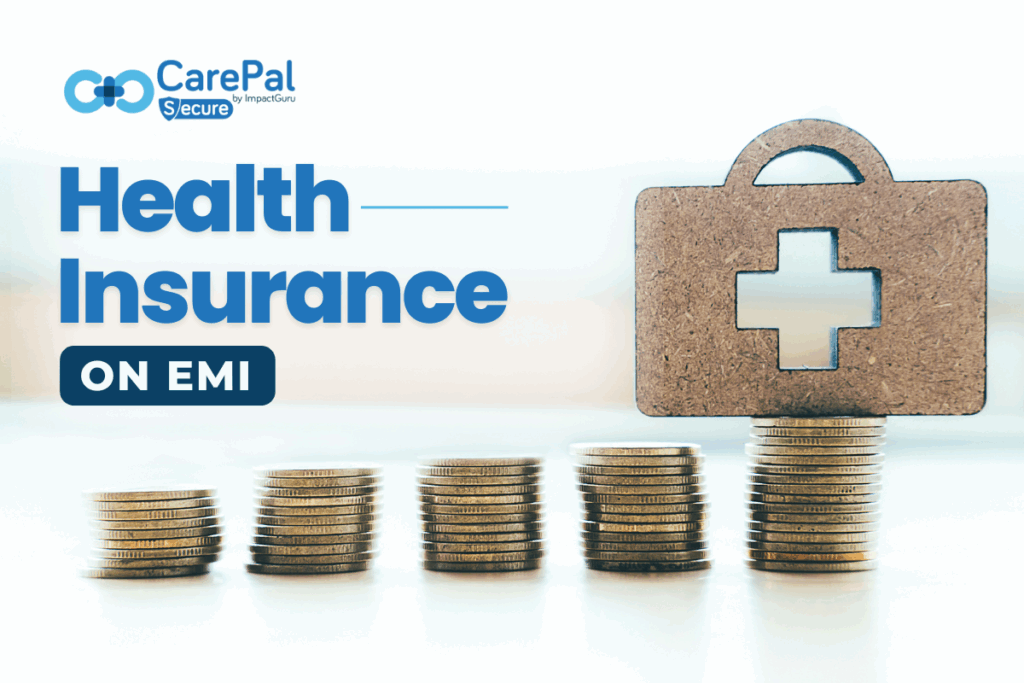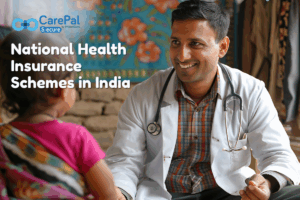Health Insurance on EMI: Affordable Plans for Every Budget

A funny wit once defined EMI as a fancy word for saying you can’t really afford it, but let’s pretend you can. And like most jokes, there is always an element of truth in there. EMIs make it easier to buy goods and services that we require, when paying in one go for the same might not be possible. Health Insurance EMI is one such option which should be considered by customers. In this era of volatility and economic uncertainty, it is more important than ever to obtain health insurance to protect against unexpected healthcare expenses. But the upfront premium payments that go along with comprehensive health insurance plans can represent a financial burden for many individuals and families. As a solution to this issue, the ability to pay health insurance premium on EMI basis has emerged, making quality healthcare more affordable and accessible. In this article, we explain health insurance on EMI option — the methods to avail of it, the pros and cons of each method, and much more. So sit back and read at leisure.
Health Insurance on EMI — All You Need to Know
Most health insurance premiums are paid annually, which entails a significant out-of-pocket fee upfront. The EMI option makes it easy to distribute the exorbitant amount over periodic intervals—monthly, quarterly, or semi-annually. There are two major ways to avail health insurance on EMI:
Purchasing insurance on monthly mode: Almost all health insurance providers offer health products on EMI payment options. Under this arrangement, the annual premium is broken down into equal monthly payments, which are to be paid by the customer. Typically, these monthly mode payments will be on autopay on credit card or bank account. Also, the insurer might charge a bit extra for this facility.
Loan or Credit Facility: Alternatively individuals can obtain health insurance on EMI option through an external financing option, such as a personal loan or credit facility in the form of a credit card, where a loan can be taken to pay the premium upfront and the amount can be paid off in EMIs.
health insurance emi option, health insurance on emi basis, health insurance on monthly emi, health insurance with emi facility
How to get health insurance on monthly emi directly from the insurer
Process: While buying a health insurance policy, ask if your insurer provides health insurance on a monthly payment basis. If they do, typically it will have some conditions like minimum sum assured/premium etc. or they might require you to have a credit card or are willing to have an autopay set up in your bank account. Insurance companies don’t want to chase you every month for premium and thus they want to automate the payment.
Advantages of monthly mode
Affordability: If you have a limited disposable income, spreading the cost of a premium over several months makes it much more affordable. This method provides people with access to full health care coverage without a large upfront financial burden.
Seamless Process: Since the insurer arranges for the direct EMI, the process is convenient, and automatic deductions from the bank account of the policyholder, reducing the chances of missing payment.
No Overhead: A number of insurers still offer EMI payment plans without any overhead in the form of interest or processing fee, ensuring the total premium paid also remains unchanged.
Disadvantages:
Loss of coverage on missed payment: If the payment fails for any reason like bank system issue or temporary unavailability of funds, it can lead to a policy lapse, leaving customer uninsured and forfeiting any waiting period credits. For people with a volatile income, this can be a big problem.
Limited Availability: EMI options are not offered by all insurers, and those that do may have certain eligibility criteria, such as minimum premium amounts or policy tenures.
Health insurance on EMI option via loan
Process: Here, the policyholder uses a personal loan or a credit card to pay the annual premium in advance. The amount borrowed is then paid back in EMIs to the lending institution over a pre-agreed duration of time.
Advantages:
Comprehensive Coverage: When the installments are paid in full, the premium for the health insurance will be paid in full, and thus the coverage will come into effect immediately without waiting for the installments to be completed.
Flexible Loan Terms: Monthly mode will typically need 12 payments in a year. However, some customers might want to pay in three or six instalments. Such customers receive more flexible options from bank and/or NBFC in creating a schedule which better suits their financial planning.
Disadvantages:
Additional interest costs– A common feature of loans and credit facilities is that they are often accompanied by an interest charge along with processing fees, which has a direct impact on the overall cost of the health insurance policy.
Credit Score: Use of credit facilities affects a person’s credit score Timely repayment of loans or credit card dues matter as failure to repay them on time can result in a negative impact on creditworthiness.
Debt Buildup: Relying on debt to cover health coverage costs puts a personal finance strain on people, especially if they’re already in debt.
Important factors to consider before choosing health insurance on EMI option
Assess Total Cost: Understand the complete cost of the policy (if you are opting for EMI payments) along with interest, fees (if any), to ensure that it is within your financial limits.
Terms and Conditions of the Policy: Go through the insurer’s terms of using the EMI payment option carefully, such as what will happen if the EMI payment is missed, under what circumstances your policy will lapse, and if there are any penalties involved.
Financial Stability: During repayment, it’s strongly recommended that you’re prepared with a regular source of income and have the necessary discipline to meet the EMI schedule, since default can not only cause a loss of coverage but also result in financial penalties.
EMI Comparison: Visit different insurers and financial entities and compare their EMI offers.
Paying health insurance on EMIs is a feasible solution for someone who would like to have a complete health cover without putting too much pressure on their pockets. Be it an EMI via insurer or any loan, it is important to know the pros and cons of each. Researching thoroughly, evaluating personal financial position and being aware of the ramifications of signing up can help individuals make smart decisions, protecting their health and also their finances. While the EMI option enables the policyholder to manage their expenses better, it is important to stay consistent with the payments so that the insured party continues to receive uninterrupted health coverage. Always assign priority to policies that suit your healthcare needs and financial conditions over everything else so that you can be assured of peace of mind during the times of medical exigencies.
Conclusion:
Secure is designed to provide you and your family with comprehensive, accessible, and affordable healthcare solutions. Whether you’re an individual, a family, or a senior citizen, there’s a plan designed to provide financial security and peace of mind.
Some key reasons why you should choose CarePal Secure are:
Extensive Coverage: Get access to a wide network of hospitals for cashless treatments, covering everything from regular health check-ups to major hospitalisations.
No Waiting Period for Essential Coverage: CarePal Secure offers immediate access to essential healthcare benefits so that yCarePal ou can receive critical medical treatment without long approval delays.
24/7 Medical Assistance & Claims Support: Our dedicated helpdesk is available round-the-clock to assist you with medical emergencies, claim processing, and consultation bookings.
Teleconsultations & Healthcare Discounts: Our seamless teleconsultation services allow you to access specialists across 18+ medical fields. Additionally, you can enjoy significant savings on medicines, diagnostic tests, and outpatient care, making quality healthcare more affordable.
Affordable Plans with Super Top-Up Options: Choose from a range of budget-friendly plans for individuals, families, and seniors. Our super top-up policy for seniors provides additional financial protection, covering larger medical expenses at a lower cost.
Tax Benefits Under Section 80D: The premiums paid toward CarePal Secure health insurance are tax-deductible, helping you save money while ensuring comprehensive coverage for yourself and your family.
With trusted partners nationwide, CarePal Secure ensures that quality healthcare is always within reach. So what are you waiting for? Join 80,000+ satisfied customers who trust CarePal Secure for their healthcare needs.
Get in touch with us to know the right plan for you
Frequently Asked Questions
Yes, many insurers now allow you to pay premiums monthly, quarterly, or in easy EMIs instead of a lump sum.
It makes health insurance more affordable, helps manage cash flow, and allows access to better coverage without upfront financial stress.
Many leading providers like Star Health, HDFC Ergo, and Care Insurance offer EMI options. Check with the insurer or aggregator platforms for details.
You can apply online or through an agent. Just select the EMI option at checkout or request it while purchasing through offline channels.
No, your coverage remains the same as long as you pay premiums on time. Delayed or missed payments may lead to policy lapse.

Pankaj Nawani is an accomplished insurance professional with over 20 years of industry experience. His journey has reinforced two key beliefs: that insurance is a powerful force for good and that India needs significantly more of it. Passionate about transforming the sector, Pankaj is on a mission to redefine insurance for India, focusing on innovation across products, sales, and servicing. He collaborates with visionary entrepreneurs, founders, and investors to bring this vision to life.












